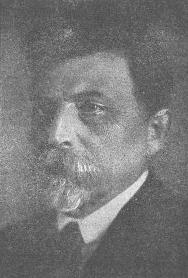
Magnus T. Hirschfeld was a Jewish German physician and sexologist, whose citizenship was later revoked by the Nazi government. Hirschfeld was educated in philosophy, philology and medicine. An outspoken advocate for sexual minorities, Hirschfeld founded the Scientific-Humanitarian Committee and World League for Sexual Reform. He based his practice in Berlin-Charlottenburg during the Weimar period. Performance Studies and Rhetoric Professor Dustin Goltz characterized the committee as having carried out "the first advocacy for homosexual and transgender rights".

The Eulenburg affair was a public controversy surrounding a series of courts-martial and five civil trials regarding accusations of homosexual conduct, and accompanying libel trials, among prominent members of Kaiser Wilhelm II's cabinet and entourage during 1907–1909. It has been described as "the biggest homosexual scandal ever."

Maximilian Harden was an influential German journalist and editor.
Hans Schmidt was a German-born naturalized American citizen, member of the Waffen-SS during World War II, and founder of the German-American National Political Action Committee (GANPAC). He was primarily known for his promotion of White separatism, Nazism, antisemitism, and Holocaust denial. Schmidt was arrested in Germany on hate charges in 1995, but avoided standing trial by returning to the USA while released on bail.

Wilhelm Münzenberg was a German Communist political activist and publisher.

Philipp, Prince of Eulenburg and Hertefeld, Count of Sandels was a diplomat of the German Empire who achieved considerable influence as close friend of Wilhelm II, German Emperor.

DavidBergelson was a Yiddish language writer born in the Russian Empire. He lived for a time in Berlin, Germany, before moving to the Soviet Union following the Nazi rise to power in Germany. He was a victim of the post-war antisemitic "rootless cosmopolitan" campaign and one of those executed on the Night of the Murdered Poets.

Arbeiter-Illustrierte-Zeitung or AIZ was a German illustrated magazine published between 1924 and March 1933 in Berlin, and afterward in Prague and finally Paris until 1938. Anti-Fascism and pro-Communism in stance, it was published by Willi Münzenberg and is best remembered for the propagandistic photomontages of John Heartfield.

Der Angriff was the official newspaper of the Berlin Gau of the Nazi Party. Founded in 1927, the last edition of the newspaper was published on 24 April 1945.
Yidisher Kultur Farband was a Communist-oriented organization, formed for preserving and developing Yiddish culture in Yiddish and in English, through an art section, a writers' group, reading circles, and publications. YKUF was founded in Paris in September 1937 by Jewish Communists and their supporters as an international body to disseminate ideology to the Yiddish-reading and Yiddish-speaking community.

Chaim Zhitlowsky was a Jewish socialist, philosopher, social and political thinker, writer and literary critic born in Ushachy, Vitebsk Governorate, Russian Empire.
During the nine decades since its establishment in 1919, the Communist Party USA produced or inspired a vast array of newspapers and magazines in at least 25 different languages. This list of the Non-English press of the Communist Party USA provides basic information on each title, along with links to pages dealing with specific publications in greater depth.
This is a list of events in Lesbian, Gay, Bisexual, Transgender, Queer and Intersex (LGBTQ+) history in Germany.

The Neue Rundschau, formerly Die neue Rundschau, founded in 1890, is a quarterly German literary magazine that appears in the S. Fischer Verlag. With its over 100 years of continuous history, it is one of the oldest cultural publications in Europe.
The Congress for Jewish Culture is a secular organization founded in 1948 to promote Yiddish culture throughout the world. Individuals active in the founding of the organization included Yiddish writers and intellectuals such as Shmuel Niger, Chaim Grade, Avrom Reyzen, Shmerke Kaczerginski, and Pinkhos Schwartz. At its founding, the society had offices in New York City, Buenos Aires and Paris. Today, only the New York office remains active.
Rokhl Brokhes was a Yiddish-language writer from Minsk. She was the author of stories, plays, and children's stories.
Bruno Frei was a political (Marxist) writer and journalist. He was born in Preßburg which at that time was part of the Austro-Hungarian empire, and the family moved to Vienna in 1909. Following the frontier changes mandated in 1919, he spent much of his adult life and career in that city, although he spent six of the Hitler years exiled in Mexico.
The following is a timeline of lesbian, gay, bisexual, transgender and queer (LGBTQ) journalism history.
Jacob Rombro, better known by his pen name Philip Krantz, was a Russian-born Jewish-American socialist, newspaper editor, and Yiddish writer.
Emil Unfried was a German communist politician. He served in various capacities in the Communist Party until 1924. Then he involved in film industry. He resumed his political activity in the Communist Party in 1945. However, the same year he was detained by the Soviets and died in a special camp in Sachsenhausen in 1949.









